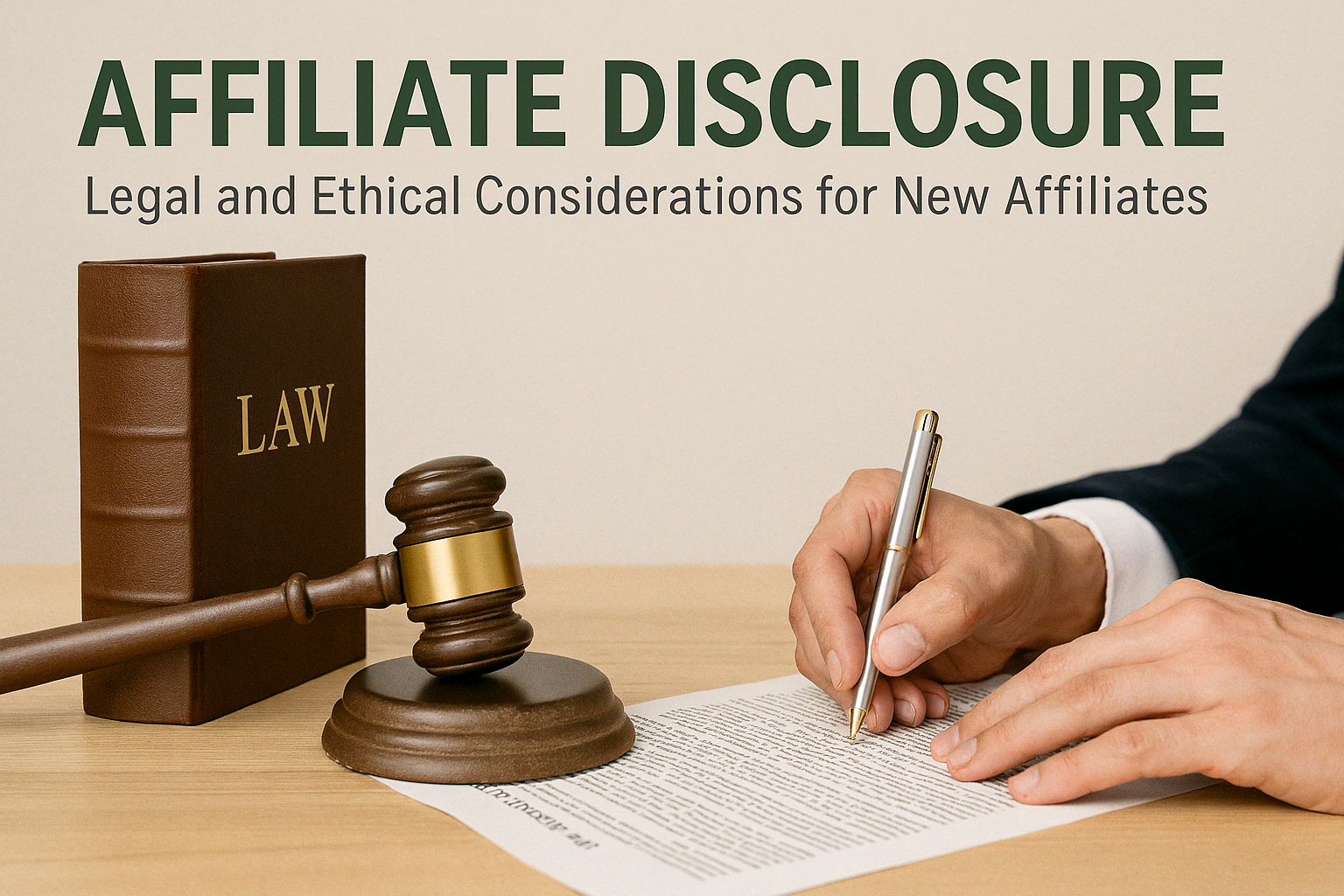Affiliate Disclosure: Legal and Ethical Considerations for New Affiliates
Are you new to affiliate marketing and wondering about legal and ethical rules? Do you know the Federal Trade Commission (FTC) rules on disclosure? Affiliate marketing can be complex, but knowing about affiliate disclosures is key.
The FTC says affiliate link disclosures are a must for marketers who make money from product links. It’s smart to put these disclosures near affiliate links to keep things clear and build trust. Keeping your disclosures the same in all your posts makes your content reliable and consistent.
Having a special page for affiliate disclosures can make things easier and clearer. Using your own words in these disclosures can make them feel more real and trustworthy to your readers. Tools like Pretty Links can help you add these disclosures quickly, saving you time and keeping you in line with the law.
Putting disclosures at the start of blog posts and near links can help you follow the law, build trust with your audience, and meet platform rules1.
Before exploring the compliance requirements for affiliate marketers, it’s beneficial to have a solid grasp of the fundamental structure of affiliate marketing and why transparency matters within this increasingly regulated digital business model.
Key Takeaways:
- The FTC requires transparent and conspicuous affiliate disclosures to protect consumers.
- Disclosures should be placed visibly near affiliate links to establish trust and reliability.
- Using a consistent format and personalized language can enhance the authenticity of disclosures.
- Automated tools like Pretty Links can simplify the process of creating and inserting affiliate disclosures.
- Implementing comprehensive disclosure practices can help ensure legal compliance and audience trust.
Understanding the Basics of Affiliate Marketing Disclosures
Affiliate marketing is a key digital marketing strategy. It involves promoting products or services for a commission. But, it’s important to be open about these relationships with consumers. Knowing the basics of affiliate marketing disclosures helps new affiliates build trust and follow the rules.
What Constitutes an Affiliate Relationship
An affiliate relationship happens when someone promotes products for money. This can be a commission or other payment. It’s important to tell readers about this to stay honest and avoid tricks.
Key Components of Affiliate Disclosure Requirements
Good affiliate disclosures use simple language. They should be easy to see. And, they should explain the relationship with the companies. Following these rules helps keep trust with your audience and avoids legal problems.
Why Disclosures Matter in Digital Marketing
Affiliate disclosures are more than just rules; they’re key to trust and honesty in digital marketing. The Federal Trade Commission (FTC) says they’re vital for fair business and protecting consumers. Being open about money involved helps build stronger bonds with your audience and shows you’re committed to honest marketing.
| Affiliate Disclosure Examples | Description |
|---|---|
| Statrys | Statrys has a page for their affiliate disclosure, explaining their partnerships and how they get paid. |
| Cookie and Kate | Cookie and Kate puts affiliate disclosures at the bottom of posts, making it clear for their readers. |
| The Beauty Look Book | The Beauty Look Book tells readers about financial ties in their content, keeping them informed. |
| Where in the World is Nina | Where in the World is Nina has a detailed affiliate disclosure page for their partnerships. |
Learning about affiliate disclosure requirements helps new affiliates confidently navigate the digital world. It builds trust with their audience and ensures they follow the rules.
FTC Guidelines and Compliance Requirements
Affiliate marketers must follow FTC rules to avoid legal trouble. The FTC affiliate guidelines wants us to be open about our deals with brands. This means we must clearly tell our audience when we get paid to promote products.
The FTC has new rules for online influencers and bloggers. They say we must be upfront about any deals we have with brands. This helps keep our audience from getting misled.
We need to tell our audience about any deals we have with brands. This is key to following the FTC’s rules. If we don’t, we could face serious legal issues and harm our reputation.
Being open about our deals helps us avoid legal problems. It also builds trust with our audience. Recent 2024 consumer research indicates that 73% of consumers are more likely to trust brands that maintain transparent affiliate relationships, with 68% stating they prefer clear disclosure over hidden partnerships.
Compensation for Affiliate Marketers
Affiliate marketers get paid in many ways. This includes commissions, free products, bonuses, and more. We must always tell our audience about these deals to follow FTC rules.
Entities Needing Affiliate Disclosure
Many online personalities need to follow FTC rules. This includes bloggers, influencers, and website owners. They must be clear about any deals they have with brands.
Importance of FTC Affiliate Disclosure
- Legal Compliance: Not following FTC rules can lead to fines and penalties.
- Transparency: Telling our audience about deals helps keep things honest.
- Trust and Credibility: Being open builds trust with our audience.
Steps to Create an FTC Affiliate Disclosure
- Placement: Put the disclosure where it’s easy to see.
- Language: Use simple language that’s easy to understand.
- Readability: Make sure it’s easy to read without straining.
- Integration: Make it part of the content without disrupting it.
FTC Affiliate Disclosure Examples
| Website | Disclosure Style |
|---|---|
| Smart Bark | Start of post disclosure with additional page link |
| GLAMOUR | Simple text with a different font |
| Cosmopolitan | Minimalistic text on product pages |
| Byrdie | Minimalistic style on articles with additional page link |
| Forbes | Highly visible text with unbiased evaluation statement |
| Digital PR Tips | Simple, to the point disclosure in newsletter |
| Emily Norris (YouTube) | Disclosure in video description and mentioned in the video |
| Themeparkmomlife (Instagram) | Simple text outlining free product review |
Creating Clear and Conspicuous Disclosures
Transparency practices is crucial in affiliate marketing. Affiliates need to place their disclosures in a way that’s easy for consumers to see. By doing this, we can build trust and follow the rules.
Placement Best Practices
The FTC wants affiliate disclosures to protect consumers from false marketing. Disclosures should be near affiliate links or at the start of content. Hiding them is not okay and can lead to trouble.
Language and Formatting Guidelines
Disclosures need to be clear and to the point. They should show the affiliate link without needing extra clicks. Using bold text or different colors can help them stand out.
Mobile-Friendly Disclosure Considerations
Disclosures must be easy to see on phones. Affiliates should make sure their disclosures work well on small screens. This means using designs that work on all devices.
By following the right steps for disclosures, affiliates can earn trust and follow the law. Keeping disclosures clear and consistent is key for a good affiliate marketing strategy.
Legal Implications of Non-Disclosure
Not telling about affiliate relationships can lead to big legal consequences. Disclosure violations might cause FTC penalties like orders to stop, big fines, and even jail time. Companies that ignore FTC rules can harm their reputation and lose customer trust. This can hurt their affiliate marketing success.
NDAs can protect secrets of one or both parties. Once signed, NDAs are legally binding if they are well-made and signed correctly. Breaking an NDA can lead to legal trouble, like contract breaches, misuse of trade secrets, and intellectual property issues.
Reciprocal NDAs are used when both sides share sensitive info for business reasons. These agreements say the receiving party must keep secrets safe for a set time. Not following the NDA can cause legal problems, showing why clear disclosure is key in affiliate marketing.

To keep safe and protect partners, affiliates must be open about their ties. They must follow all needed disclosure rules. This way, they can earn trust, protect their businesses, and confidently move through the affiliate marketing world.
Building Trust Through Transparency
Affiliate Marketing Transparency is key to building trust in the industry. By openly sharing our affiliate ties, we show we’re committed to fair play. This lets our audience make smart choices. In the U.S., the Federal Trade Commission (FTC) requires us to share our affiliate links. This shows how vital honesty is in this field.
Regulatory bodies like the FTC help keep affiliate marketing honest. They make sure we’re open with our audience, helping them make better choices.
Impact on Audience Relationships
Being open about our affiliate ties strengthens our bond with our audience. It’s vital for building trust with both our audience and partners. When people trust our advice, they’re more likely to stick with us and support us.
Long-term Benefits of Honest Marketing
Honest marketing builds trust and brings lasting rewards. Trust and credibility lead to loyal customers and more sales. By always sharing our affiliate ties, we stand out and become leaders in our fields.
Case Studies of Successful Disclosure Practices
Top brands in affiliate marketing show us how to do it right. Following the rules and being ethical is crucial. For example, Wire cutter is known for its honest product reviews and clear affiliate ties.
Pat Flynn from Smart Passive Income also wins trust by being open about his earnings and choices. His honesty has built a strong following.
By following the lead of these successful brands, we can gain long-term benefits. We become trusted voices in our niches through transparency and honesty.
Affiliate Disclosure Templates and Examples
For new affiliates, clear and upfront affiliate disclosures are key. They should be easy to read and look good. This builds trust with your audience. The US Federal Trade Commission (FTC) regulations say it’s important to be honest about your financial ties.
Make sure your affiliate disclosures are easy to spot and understand. Put them at the start of your content or in a special section. Use simple phrases like “This post contains affiliate links” or “I earn a commission from qualifying purchases.” Missy Ward, CEO of Affiliate Summit, shows how important it is to be open about affiliate links before each blog post.
It’s also important to adjust your disclosures for different platforms. On social media, short hashtags like “#ad” or “#affiliatelink” work well. For those without websites, verbal disclosures in videos or audio are okay.
| Affiliate Disclosure Examples | Effective Characteristics |
|---|---|
|
|
Using affiliate disclosures consistently builds trust and follows FTC rules. By using good templates, new affiliates can be honest and successful in digital marketing.

Being open about affiliate links is crucial for trust with your audience. The FTC says disclosures should be clear and not hidden in small print.
“Affiliate marketing is all about building trust with your audience. Transparent and consistent disclosure is the foundation of that trust.” – Missy Ward, CEO of Affiliate Summit
By following best legal affiliate marketing practices and using good templates, new affiliates can be credible. They can build strong relationships with their audience and follow the affiliate compliance rules.
Privacy Laws and Data Protection in Affiliate Marketing
Affiliate marketing is growing fast, but complying with privacy laws is becoming more challenging. Affiliates must follow major regulations like the GDPR and CCPA. Since February 2024, the EU’s Digital Services Act has been affecting affiliate marketing platforms by increasing ad transparency and accountability. This helps protect consumer data and build trust.
GDPR Compliance Requirements
The GDPR sets tough rules for handling personal data of EU residents. Affiliates need to get clear consent, give data access and deletion, and keep data safe. They also must tell users how they use data and handle breaches.
CCPA Guidelines for Affiliates
The CCPA also has strict rules for data of California residents. Affiliates need to tell consumers how they use data, offer opt-out choices, and give data access and deletion rights.
International Privacy Considerations
Affiliates also face rules from other countries like Brazil’s LGPD, Canada’s PIPEDA, and Australia’s Privacy Act. These laws want consent, data rights, and strong security. This means affiliates need a global plan for protecting data.
| Regulation | Key Requirements |
|---|---|
| GDPR | Explicit consent for data collection, data access and deletion rights, data security, breach notification |
| CCPA | Inform consumers about data practices, provide opt-out options, grant data access and deletion rights |
| LGPD (Brazil) | Consent for data processing, data rights, data deletion |
| PIPEDA (Canada) | Consent for data collection, data security |
| Privacy Act (Australia) | Data transparency, data access and correction rights |
Affiliate marketers must keep up with changing privacy laws. This ensures data is safe and trust is kept.
“Following legal standards keeps data safe and builds trust in affiliate marketing.”
Ethical Marketing Practices for Affiliates
As affiliates, we are key in keeping the digital marketing world trustworthy. Ethical affiliate marketing means putting our audience first, giving honest product reviews, and being clear in our promotions.
Practices like hiding relationships or making false claims might bring quick sales. But, they can hurt our reputation and lead to legal issues. We should aim for transparency by openly sharing our affiliate ties and any biases.
Sticking to ethical standards helps us earn our audience’s trust. This way, we help the affiliate marketing world grow and thrive. We must share accurate info, respect privacy, and avoid false or exaggerated claims.
One big challenge is making sure our disclosures are clear and easy to find. Tools like “Pretty Links” help us manage links and ensure our disclosures are clear. Following these guidelines shows we’re serious about being open and honest.
In the end, ethical affiliate marketing is not just the right thing to do. It’s also smart for our business. It boosts our visibility, improves our search rankings, and leads to lasting success. By focusing on our audience and being transparent, we build a strong reputation and lasting connections.

“Ethical affiliate marketing is the foundation for building trust and driving long-term success in the industry.”
Content Authenticity and Disclosure Integration
In the world of affiliate marketing, making content that feels real is key. Today’s audiences are smart and can tell when something is just trying to sell them something. By mixing in natural disclosures and keeping our content honest, we can earn their trust. This trust leads to better affiliate marketing results.
Natural Disclosure Placement
It’s important to add affiliate disclosures in a way that doesn’t mess up the flow of our content. Instead of using big, obvious disclaimers, we should blend in affiliate info smoothly. This makes for a better experience for our readers and follows the best practices.
Maintaining Editorial Integrity
Keeping our content honest is a challenge in affiliate marketing. We want to share products that fit our brand and what our audience likes, but we must stay unbiased and informative. When we give real value to our readers, we become trusted voices in our fields. This leads to more genuine and profitable affiliate partnerships.
At the heart of successful affiliate marketing is content that feels real. By adding natural disclosures and staying true to our editorial standards, we create content that connects with our audience. This connection builds trust and leads to lasting success in affiliate marketing.
“Transparency is considered a foundational element for credible brand reputation in digital marketing.”
Platform-Specific Disclosure Requirements
As affiliates move through the digital world, knowing the rules for each platform is key. Social media disclosures, blog disclosure rules, and video content guidelines are all important. They help keep things clear and follow the law.
On social media, using hashtags like #ad or #sponsored is common. This tells people when content is paid for24. These tags should be near the sponsored content so everyone can see them.
Bloggers need to clearly show when they have affiliate links. This is usually at the start of the post. It helps readers know what they’re getting and builds trust.
For videos, affiliates might need to say or show on-screen who paid for the content. Following these rules helps keep everything honest and fair.
“Following the rules for each platform is key for affiliates. It keeps them in line and builds trust with their audience.”
Keeping up with the latest rules helps affiliates do well. They can make their marketing better and grow their success over time.
Maintaining Compliance Across Channels
Good affiliate marketing means knowing the rules for each place online. Following these rules helps affiliates stay true to their audience and avoid trouble.
By being open about their content, affiliates show they care about honesty. This makes their marketing stronger and builds trust with their followers.
It’s smart to check and update how you share information often. Also, training all affiliates and influencers helps keep everyone on the same page.
Monitoring and Updating Disclosure Practices
Keeping transparency and ethical marketing in the affiliate world is key. Regular audits of disclosures are vital. They ensure we follow rules, like the FTC’s, to keep our endorsements trustworthy.
It’s important to stay updated on new rules and best practices. This means knowing the specific rules for affiliate links on platforms like Amazon Associates.
Monitoring compliance is crucial for transparency. We check our content often and update disclosures as needed. The FTC also watches social media for any paid endorsements.
Successful sites like Making Sense of Cents and The Points Guy show how to do it right. They make sure their affiliate links are clear and follow the rules. This builds trust with their audience.
| Disclosure Best Practices | Key Considerations |
|---|---|
| Placement | Disclosures should be easily accessible to users, with the best placement being at the top of a blog post according to the FTC guidelines26. |
| Language and Formatting | The disclosure language should be clear and easy to understand, avoiding technical terms to ensure visitor comprehension27. Disclosures do not need to be lengthy, with 1-3 standard sentences being sufficient27. |
| Mobile Responsiveness | Disclosure placement should be optimized for mobile devices to maintain transparency across all platforms27. |
Improving disclosure practices shows we’re serious about transparency and ethics in the affiliate world. By keeping up with changes, we can keep our audience’s trust. This leads to long-term success in digital marketing.
“Establishing clear rules and educating affiliates on the importance of proper disclosure practices is crucial for maintaining trust and credibility in affiliate programs.”
Conclusion
Exploring ethical affiliate marketing practices is key for lasting success online. Following legal compliance and industry standards is crucial. It builds trust with our audience and keeps us safe from legal trouble.
Keeping our disclosure practices up to date is vital. This ensures we stay compliant and keep our affiliate marketing efforts honest. Being open and clear in our communications helps protect our business. It also builds strong bonds with our audience.
The FTC has led in setting rules for affiliate marketing for over 50 years. We must stay alert to new guidelines and practices. By following ethical marketing principles, we can succeed in the ever-changing digital world. This way, we build a affiliate marketing business that earns trust and loyalty.
FAQ
Q1: Do I need affiliate disclosures for every single affiliate link? A: Yes, the FTC requires disclosure for any content where you receive compensation, including commissions, free products, or other benefits. Each piece of content containing affiliate links should have appropriate disclosure.
Q2: Can I use a single disclosure page instead of individual post disclosures? A: While a disclosure page is helpful, it’s not sufficient alone. The FTC requires disclosures to be “clear and conspicuous” near the affiliate content itself. Individual post disclosures are necessary.
Q3: What happens if I forget to include a disclosure? A: Missing disclosures can result in FTC warnings, fines, or legal action. It’s better to over-disclose than under-disclose. Implement systems to ensure consistent disclosure across all content.
Q4: Are there different rules for different social media platforms? A: While FTC rules apply universally, platforms have specific formatting requirements. Instagram allows #ad hashtags, YouTube requires verbal or visual disclosures, and TikTok has built-in branded content tools.
Q5: How do international laws affect my affiliate disclosures? A: If you have international audiences, you may need to comply with GDPR, CCPA, and other regional privacy laws. These often require more detailed consent and data handling disclosures.
Q6: Can I use automated tools to add disclosures? A: Yes, tools like Pretty Links, ThirstyAffiliates, and AffiliateWP can automate disclosure insertion. However, ensure the automated disclosures meet FTC visibility and clarity requirements.
Q7: Do I need disclosures for affiliate links in email newsletters? A: Absolutely. Email marketing containing affiliate links requires the same level of disclosure as website content. Include disclosures at the top of newsletters or near specific affiliate content.
Q8: What’s the difference between #ad and #affiliate? A: #ad indicates sponsored content, while #affiliate indicates commission-based relationships. Use #affiliate for traditional affiliate marketing and #ad for sponsored posts or brand partnerships.
Q9: How often should I review and update my disclosure practices? A: Review disclosures quarterly and update them whenever regulations change, you join new affiliate programs, or modify your content strategy. Stay current with FTC guidance updates.
Q10: Can I be held liable for my affiliate partners’ actions? A: Potentially, yes. If affiliate partners make false claims about products you promote, you could share liability. Choose reputable partners and monitor their marketing practices.
Source Links
[1] https://prettylinks.com/blog/affiliate-link-disclosures-best-practices/ – Affiliate Link Disclosures: How to Stay Compliant and Build Trust
[2] https://termly.io/resources/articles/affiliate-disclosure/ – Affiliate Disclosure: Examples & Writing Guide
[3] https://tapfiliate.com/blog/affiliate-disclosure/ – Affiliate Disclosure: Why do Your Affiliates Need One? – Blog – Tapfiliate
[4] https://www.ftc.gov/business-guidance/resources/ftcs-endorsement-guides-what-people-are-asking – FTC’s Endorsement Guides: What People Are Asking
[5] https://www.ftc.gov/business-guidance/resources/disclosures-101-social-media-influencers – Disclosures 101 for Social Media Influencers
[6] https://www.referralcandy.com/blog/ftc-affiliate-disclosure – FTC Affiliate Disclosure: How to Stay Compliant + 8 Examples
[7] https://termly.io/resources/articles/ftc-affiliate-disclosure/ – FTC Affiliate Disclosure
[8] https://www.termsfeed.com/blog/affiliate-disclosure/ – Disclosures for Affiliate Links – TermsFeed
[9] https://federal-lawyer.com/ftc-defense/affiliate-disclosure/ – Understanding the FTC’s Affiliate Disclosure Rules
[10] https://www.ftc.gov/business-guidance/advertising-marketing/endorsements-influencers-reviews – Endorsements, Influencers, and Reviews – FTC Business Guidance
[11] https://www.digivate.com/blog/affiliate-marketing/affiliate-marketing-compliance/ – The Complete Guide to Affiliate Marketing Compliance for Brands in 2025
[12] https://www.forbes.com/councils/forbestechcouncil/2023/08/23/how-to-build-trust-and-credibility-in-affiliate-marketing/ – Council Post: How To Build Trust And Credibility In Affiliate Marketing
[13] https://www.authorityhacker.com/affiliate-disclosure/ – 12 Affiliate Disclosure Examples & Best Practices (2024)
[14] https://breezy.io/blog/how-to-disclose-affiliate-links – How to Disclose Affiliate Links & Fun Disclosure Examples
[15] https://affiliates.fiverr.com/blog/affiliate-link-disclosures-10-examples-templates-and-best-practices/ – Affiliate Link Disclosures: 10 Examples, Templates, and Best Practices – Fiverr Affiliates
[16] https://usercentrics.com/guides/privacy-led-marketing/affiliate-marketing-compliance/ – Affiliate Marketing Compliance – What You Need To Know
[17] https://tapfiliate.com/blog/data-privacy-in-affiliate-marketing-gp/ – Data Privacy in Affiliate Marketing: Best Practices
[18] https://inbeat.agency/blog/ftc-guidelines-for-influencers – FTC Guidelines for Influencers: Everything You Need to Know in 2025
[19] https://prettylinks.com/blog/ethical-affiliate-marketing/ – How to Build Trust with Ethical Affiliate Marketing Techniques
[20] https://reach-influencers.com/ftc-guidelines-for-influencers/ – Ethical Considerations in Affiliate Marketing
[21] https://ranking-articles.com/considerations-in-affiliate-marketing-content/ – Ethical Considerations In Affiliate Marketing Content
[22] https://www.benlabs.com/resources/ad-disclosure-rules-global/ – The FTC and Beyond: Ad Disclosure Rules Around the World
[23] https://profiletree.com/transparency-in-content-marketing/ – Transparency in Content Marketing: Building Audience Trust
[24] https://bixgrow.com/ftc-affiliate-disclosure/ – FTC Affiliate Disclosure – How to comply with it and examples
[25] https://partnercentric.com/blog/how-to-properly-disclose-ftc-endorsements/ – How to Properly Disclose FTC Endorsements: A Comprehensive Guide for E-commerce Sites and Influencers – PartnerCentric
[26] https://affiliatewp.com/affiliate-link-disclosure/ – What is an Affiliate Link Disclosure? (Examples + Guide)
[27] https://www.fastcomet.com/blog/affiliate-disclosure – Everything You Need to Know About Affiliate Link Disclosures
[28] https://thirstyaffiliates.com/blog/what-is-an-affiliate-disclosure – What is an Affiliate Disclosure? (Everything You Need to Know) | ThirstyAffiliates
[29] https://kinsta.com/affiliate-academy/affiliate-disclosures/ – Affiliate Disclosures — How to Write and Add Them to Your Affiliate Site
[30] https://diggitymarketing.com/learn-affiliate-marketing/affiliate-link-disclosure-examples/ – Affiliate Link Disclosure Examples | 11 Unique Approaches







